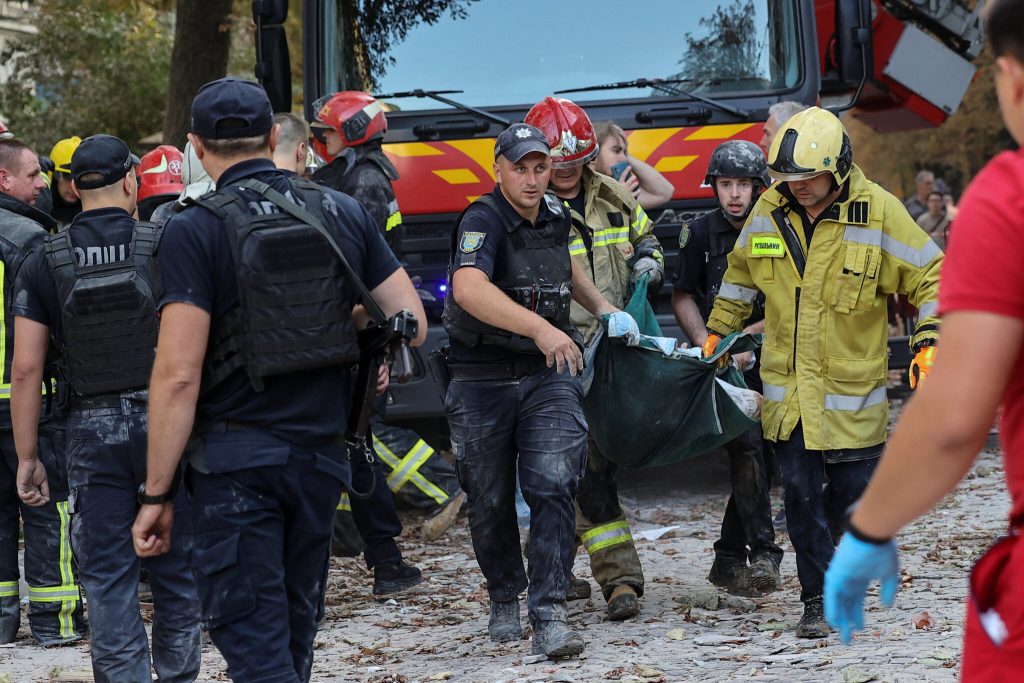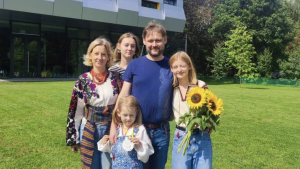Devastation Strikes Lviv: Mother and Daughters Among Victims of New Russian Assault
3 min read

In a tragic escalation of violence, a mother and her three daughters were among seven people killed in Lviv, a city in western Ukraine, during a recent surge of Russian attacks. Among the deceased were also a baby and another young girl, according to officials.
The assault, which occurred early Wednesday morning, saw Russia deploying drones and hypersonic missiles against Lviv. This attack coincided with Ukraine’s response to its deadliest single bombardment this year, which targeted a military institute in the central city of Poltava and resulted in 53 fatalities.
As Lviv endured this new wave of strikes, explosions were also reported over Kyiv, where air defenses engaged Russian missiles. The city of Kryvyy Rih also experienced damage, with a hotel being hit and surrounding residential buildings sustaining injuries; five individuals were wounded in that attack.
Witnesses in Lviv reported that the city was struck around 05:40 local time (02:40 GMT), amidst a nationwide air raid alert. The Russian defense ministry claimed responsibility for targeting Ukrainian defense industry facilities in Lviv with Kinzhal hypersonic missiles, asserting that all designated targets were successfully hit. However, Lviv Mayor Andriy Sadovy reported that the attack caused significant damage to over 50 buildings in the city, including homes, schools, and clinics.
In a poignant revelation, Sadovy shared a picture of a local family, detailing that only the father survived the attack. His wife, Yevgenia, and their three daughters—Darina, Emilia, and 21-year-old Yaryna—were killed in their home. The Ukrainian air force reported that Russia launched 13 missiles and 29 attack drones, of which seven cruise missiles and 22 drones were intercepted and destroyed.

The mayor noted that some strikes hit areas near the railway station, and Lviv regional administration head Maksym Kozytskyi confirmed that residential buildings were among those damaged. Although Lviv had largely avoided the worst of the conflict over the past two and a half years, recent Russian strikes had targeted its energy infrastructure, causing power outages.
President Volodymyr Zelensky reiterated his call for Western allies to provide Ukraine with long-range weapons to extend its defense capabilities into Russia. In Poltava, rescue workers continued to sift through the rubble of the military communications institute, searching for survivors.
Mykyta Petrov, a 26-year-old cadet who had just begun his training two weeks ago, recounted the harrowing moments when two missiles struck the institute shortly after 09:00 local time (06:00 GMT) on Tuesday. The second missile exploded just three seconds after the first, creating a scene of chaos and destruction. “There was smoke and dust everywhere… lots of people were outside having a cigarette, and many were killed,” Petrov said, visibly shaken by the experience.
Ukrainian MP Oleksiy Goncharenko highlighted the inadequacy of the air raid siren, noting that the two-minute warning was insufficient for people to reach safety. “You just imagine you’re on the sixth floor of some building and you need to run away downstairs. Is it realistic that you can do this in two minutes?” he questioned.
The attack on Poltava left 271 people wounded, with over 400 individuals donating blood at the main regional hospital by Wednesday afternoon. Among the injured was Oleksandr Moskvich, 38, who had been wounded previously in the intense battle for Bakhmut. President Zelensky vowed that the perpetrators would be held accountable, calling for enhanced air defenses to protect Ukraine and facilitate its own long-range missile attacks.
In response to the attacks, Ukraine’s land forces are investigating the adequacy of protection measures at the hit facility. Poltava regional governor Philip Pronin condemned the strike as “cunning and cynical,” noting that 15 people were still believed to be trapped under the rubble.
On Wednesday, President Zelensky was scheduled to meet with the Irish premier, as Ireland prepared to announce additional funding for Ukraine. The new aid package from the Irish government will provide crucial humanitarian support, aid in rehabilitation and reconstruction, and contribute to Ukraine’s long-term objectives.